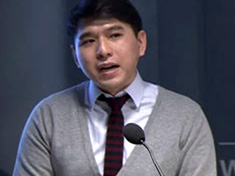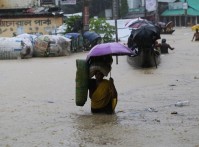-
Eric Chu on Translating Climate Adaptation Theory to Action on the Local Level
February 13, 2015 By Sarah Meyerhoff
“Adaptation is very theoretical. When you talk about ‘resilience,’ you draw these Venn diagrams and you draw these really complex issues, but at least at the IPCC level, we didn’t spend a lot of time thinking about what people were actually doing,” says Eric Chu in this week’s podcast.
“Adaptation is very theoretical. When you talk about ‘resilience,’ you draw these Venn diagrams and you draw these really complex issues, but at least at the IPCC level, we didn’t spend a lot of time thinking about what people were actually doing,” says Eric Chu in this week’s podcast.
Chu, a contributor to Working Group II of the Intergovernmental Panel on Climate Change’s Fifth Assessment Report, says the ways high-level concepts about adaptation translate to action are very important and not well understood.
“How do city governments in developing countries understand the impacts of climate change?” he asks, “how do they translate those mandates into what they’re [currently] doing?” In his dissertation, which he adapted for the Fifth Annual Graduate Student Urban Poverty Paper Competition, Chu explores these questions in three Indian cities. Each faces unique climate stressors – Surat is dealing with extreme flooding, Indore has been strained by chronic water scarcity, and Bhubaneswar has experienced more frequent cyclones. But they all share long-term relationships with external NGOs and donor agencies concerned with climate adaptation.
City governments struggled to gain support for efforts labeled “adaptation”
Chu found in each, officials and civil society groups are already working to help people adapt to climate change. The main impact of external groups was to “add to the vocabulary” of existing efforts. In some instances, the introduction of new concepts was extremely helpful. For example, a women’s water management group in Indore was better able to organize and plan their work after they understood climate change was driving much of the long-term water stress they experienced.
But on the whole, said Chu, local groups did not absorb the idea of adaptation that external groups attached to their support, choosing instead to frame their work around issues they were already addressing. City governments also struggled to gain support for efforts labeled as “adaptation,” both among citizens and public officials.
“Cities are finding it very difficult to understand how [a conception of] adaptation this broad and cross-sectoral translates into line items on a budget,” he said. “They do have budget cycles, they do have electoral cycles, where climate change doesn’t fit in.”
Outsiders’ best hope to elevate climate adaptation, then, may be to take a more grassroots approach, focusing less on how local governments can mainstream adaptation into their agendas, and more on how to build high-level mandates and incentives around existing local priorities, said Chu.
“It really needs to be internal; to have internal champions and institutional leaders, but also the policy instruments behind it to continue when [external organizations] actually leave.”
Eric Chu spoke at the Wilson Center on January 26. He is one of three winning authors of the Fifth Annual Graduate Student Urban Poverty Paper Competition who presented their work at a seminar sponsored by the Wilson Center’s Urban Sustainability Laboratory in collaboration with USAID, the International Housing Coalition, World Bank, and Cities Alliance. Download the winning papers to learn more.
Friday Podcasts are also available for download on iTunes.
 A Publication of the Stimson Center.
A Publication of the Stimson Center.







